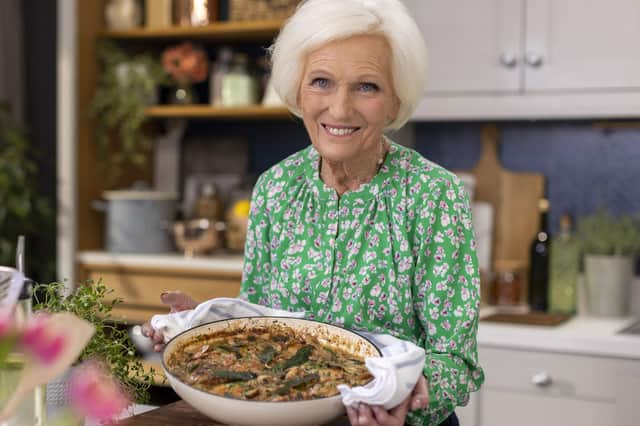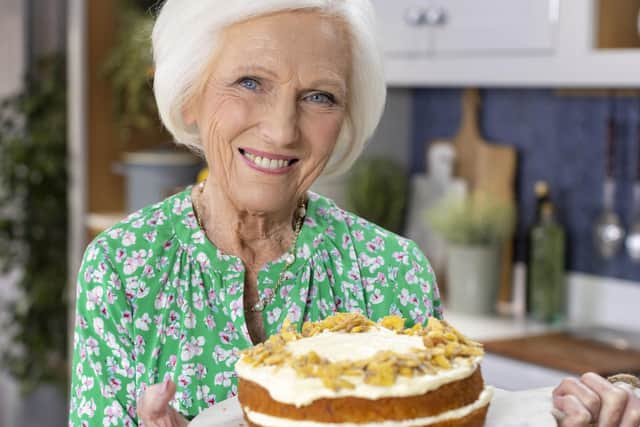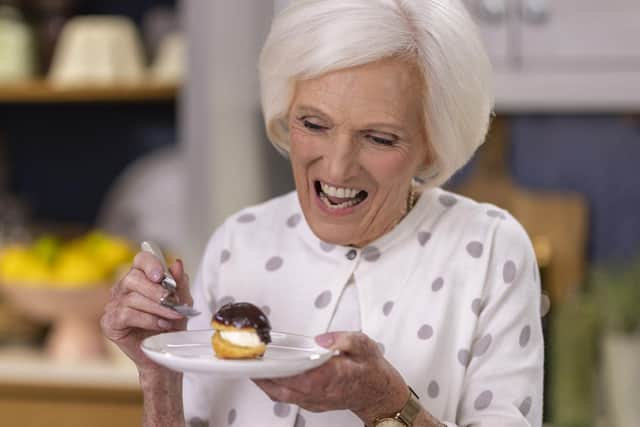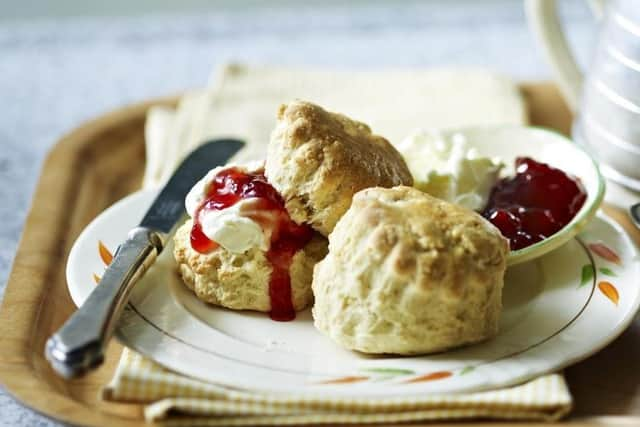Mary Berry returns with new BBC show Love to Cook


Mary Berry makes cooking seem so straightforward and soothing.
The kitchen in her new series, the aptly named Love To Cook, is softly lit and apparently stress-free.
Advertisement
Hide AdAdvertisement
Hide Ad“Oh, it’s my relaxation,” says Bath-born Berry, 86, of whipping up dinner.


The immaculately turned-out telly presenter and Cordon Bleu-trained cook has been doing so for decade-upon-decade, along the way cajoling us all to get in the kitchen and enjoy it too.
Does any house not have a Mary Berry cookbook on a shelf somewhere?
“I don’t find the kitchen stressful because I do know what I’m doing,” she says.“And I do wash up as I go along.”
Advertisement
Hide AdAdvertisement
Hide AdWander in while she is cooking though and she will undoubtedly put you to work.


“If anyone says, ‘Can I help?’ I always find something for them to do. And I think it’s quite nice, I mean, it just depends on who it is there with you.If it’s family, they’ll always lay the table or chop veg.”
Does she listen to music while she cooks?
“I should, but I don’t. I sometimes listen to the Saturday Live program first thing on BBC Radio 4, when you get Richard the vicar on,” she says, talking of the very delightful Reverend Richard Coles, of The Communards and Strictly Come Dancing fame.
“I often listen to that on Saturday morning if I’m preparing for the weekend. Isn’t he wonderful? I love it.”


Advertisement
Hide AdAdvertisement
Hide AdLove To Cook was actually commissioned at a very stressful time, at the start of the first lockdown.
“We were all beginning to cook but in a different way,” remembers Berry, who was locked down with her husband of more than 50 years, Paul.She says the experience “reminded me I love to cook” and also proved rather helpful when it came to having the time to really consider ingredients and develop recipes.Not that Berry and her long-time collaborator Lucy Young have totally upturned the Berry way of cooking – not in the least. The recipes that accompany the new series are classic Berry: “The sort that don’t have too many ingredients and [use] things you’ve got on your shelf.”
And any flavours that are relatively new to the Berry canon, for instance, preserved lemons, white miso paste, Szechuan peppercorns, pop up repeatedly, so they do not end up forlornly underused.
Filming the series was a grounded affair though. The pandemic meant Berry was restricted to travelling around England for it, but there was, she says “still lots to learn”.
Advertisement
Hide AdAdvertisement
Hide AdThe show sees her meet a group of men who have turned to piemaking to help combat “feeling low and depressed and lonely,” and she visits everywhere from Brixton Village in south London for its incredible market produce (“I knew nothing about Nigerian food”), to Carmarthenshire to forage for samphire.
In episode one she meets Terry Walton, a celebrated allotmenter who lives in a former Welsh mining town: “If you look into the hills, years gone by it would have been slag heaps, all grey,” says Berry.“And now there’s no mine there. They were beautifully covered in green.”
She was particularly enamoured with the camaraderie on Walton’s allotment: “They have a little shed, which they built out of old doors and window frames, and got electricity in there for their tea, they all go in at sort of 11 o’clock and chat, it’s socially great,” says Berry, who is a keen gardener herself.
When we speak she is absolutely inundated with perpetual spinach. “It’s always there for you,” she says.
Advertisement
Hide AdAdvertisement
Hide Ad“I picked all of our perpetual spinach about two weeks ago and there it is, up again, this baby spinach. I mean, it’s terribly rewarding.”
She is sure that many of those who’ve taken up growing their own since March 2020 will continue to do so, because it is hard to shake the feeling of pride you get eating something you magicked out of the ground.
“When we sit down to supper, my husband will say, ‘These are our carrots’ and you feel quite proud when you’ve grown them,” she says, although she’s quick to point out, her carrots are more gnarled than supermarket ones “but the flavour is there.”
Berry is not put off by the odd failure either.
“This year the asparagus hasn’t been terribly successful; some things you find grow very well in your soil, and [for] some people, it doesn’t.”
She does have to wrangle with some critics at home though.
Advertisement
Hide AdAdvertisement
Hide AdShe grew yellow tomatoes this year, and considers them delicious, but her husband does not:“He says tomatoes should be red,” she says mildly, and there is similar dissent on berries.
“My other disaster is because I grew golden raspberries,” says Berry archly.
“These are also very tasty, she says, “but of course, the family thinks they’re not the same as red ones.”
However, her lemon tree is a roaring success, although amusingly she isn’t zealous about homegrown vs supermarket fruit and veg.
Advertisement
Hide AdAdvertisement
Hide Ad“I’m very, very thrilled to use them and put them in gin and tonics and use them for cooking,” she says of her homegrown lemons.
“I love them. But I can’t really say they’re any better…”
BERRY COMES TO THE RESCUE OF THE CLUELESS IN THE KITCHEN
While Mary Berry’s Best Home Cook, which she presented alongside Claudia Winkleman, is ‘set to be axed’, Berry is also lined up to present new series Mary Berry’s Fantastic Feasts on BBC.
“Gosh, I am excited about that,” she says, explaining how it’s “very much for novice cooks”.
The idea is, instead of judging home cooks on their culinary abilities a la Best Home Cook and her days on The Great British Bake Off, Berry will help newbie cooks surprise a loved one with a feast of a meal.
Advertisement
Hide AdAdvertisement
Hide Ad“I will be teaching them, I love teaching, and then they’ll go and cook for their guests and there’ll be a party at the end,” says Berry. “They will be absolute novices, but yet, they want to have a go. I can’t wait to share my knowledge and encourage the novice cooks – and with my celebrity sidekicks by my side we will make it fun all the way!’
This show, in three parts, sees Mary impart expert knowledge and technique.
MARY’S FIRST CULINARY TRIUMPH WAS A TREACLE SPONGE PUDDING AT SCHOOL
Dame Mary Rosa Alleyne Hunnings DBE (née Berry) was born on 24 March 1935, to Margaret and Alleyne William Steward Berry. Alleyne was a surveyor who served as Mayor of Bath in 1952. Mary’s great-great-grandfather on her father’s side, Robert Houghton, was a master baker in the 1860s who provided bread for a local workhouse in Norwich.
Advertisement
Hide AdAdvertisement
Hide AdBerry attended Bath High School, where she described her academic abilities as “hopeless” until she attended domestic science classes with a teacher called Miss Date, who was particularly encouraging of her cooking abilities. Her first creation in the class was a treacle sponge pudding which she took home, and her father told her that it was as good as her mother’s.
Mary’s first job was at the Bath Electricity Board showroom and then conducting home visits to show new customers how to use their electric ovens. She would typically demonstrate the ovens by making a Victoria sponge.
Her ambition was to move out of the family home to London, which her parents would not allow until she was 21. At the age of 22, she worked toward professional qualification from the French Le Cordon Bleu school.
Mary soon beaome a recipe tester for PR firm Benson’s, where she began to write her first book. She has since cooked for a range of food-related bodies. In 1966 she became food editor of Housewife magazine. She was food editor of Ideal Home magazine from 1970 to 1973.
Advertisement
Hide AdAdvertisement
Hide AdHer first cookbook, The Hamlyn All Colour Cookbook, was published in 1970. She launched her own product range in 1994 with her daughter Annabel. The salad dressings and sauces were originally only sold at Mary’s AGA cooking school, but have since been sold in Britain, Germany and Ireland.
Berry has now published more than 75 cookery books, including her best-selling Baking Bible in 2009. She has hosted several television series and was most famously a judge on the BBC One (originally BBC Two) television programme The Great British Bake Off from its launch in 2010 until 2016, when it relocated to Channel 4.
In her own kitchen, she uses a KitchenAid mixer which she describes as being the one gadget she could not live without.
Mary Berry confides that she has always had an AGA cooker, and used to run cooking courses for AGA users. She describes Raymond Blanc’s restaurant Le Manoir aux Quat’ Saisons as one of her favourites as well as the Old Queen’s Head, local to where she lives in Penn, High Wycombe.
RECIPE: HOW TO MAKE MARY BERRY’S DELICIOUS SCONES
Advertisement
Hide AdAdvertisement
Hide AdMary Berry’s scones are the perfect easy tea-time treat, whether jam-and-cream-topped (in whichever order you like), plain with pure butter or simply on their own without any kind of additional adornment or decadently packed with extra juicy sultanas.
Equipment: You will need a fluted 5cm/2in cutter
Preparation time: less than 30 mins
Cooking time: 10 to 30 mins
Makes 16 small scones
Ingredients: You will need...
450g/1lb self-raising flour
2 level tsp baking powder
50g/1¾oz caster sugar
100g/3½oz butter, softened, cut into pieces
2 free-range eggs
a little milk
handful sultanas (optional)
To serve
strawberry jam
clotted cream
Method
Preheat the oven to 220C/200C Fan/Gas 7. Lightly grease two baking trays.
Put the flour, baking powder and sugar in a large bowl. Add the butter and rub in with your fingertips until the mixture resembles fine breadcrumbs.
Crack the eggs into a measuring jug, then add enough milk to make the total liquid 300ml/10fl oz. Stir the egg and milk into the flour – you may not need it all – and mix to a soft, sticky dough.
Advertisement
Hide AdAdvertisement
Hide AdTurn out onto a lightly floured work surface, knead lightly and work in the sultanas, if using. Roll out to a rectangle about 2cm/¾in thick.
Cut into as many rounds as possible with a fluted 5cm/2in cutter and place them on the prepared baking trays. Brush the tops of the scones with a little extra milk, or any egg and milk left in the jug.
Bake for 12–15 minutes, or until the scones are well risen and a pale, golden-brown colour. Lift onto a wire rack to cool. Eat as fresh as possible.
To serve, split the scones and serve with strawberry jam on the plain scones along with a good dollop of clotted cream.
Recipe Tips
Once the scones are cool, they can be frozen.
Advertisement
Hide AdAdvertisement
Hide AdTo eat, defrost at room temperature and then reheat in a hot oven for 10 minutes.
The scone dough should be slightly sticky to give the best results.
Don’t over handle the dough or it will be tough and don’t be tempted to roll it out too thinly or you won’t get good deep scones.
Always cut the scones straight down and up, without twisting the cutter.
This way the scones should rise evenly.
For larger 5cm/2in scones, bake for 10-12 minutes.
Mary Berry: Love To Cook starts Thursday November 11 at 8pm on BBC Two.
Comment Guidelines
National World encourages reader discussion on our stories. User feedback, insights and back-and-forth exchanges add a rich layer of context to reporting. Please review our Community Guidelines before commenting.